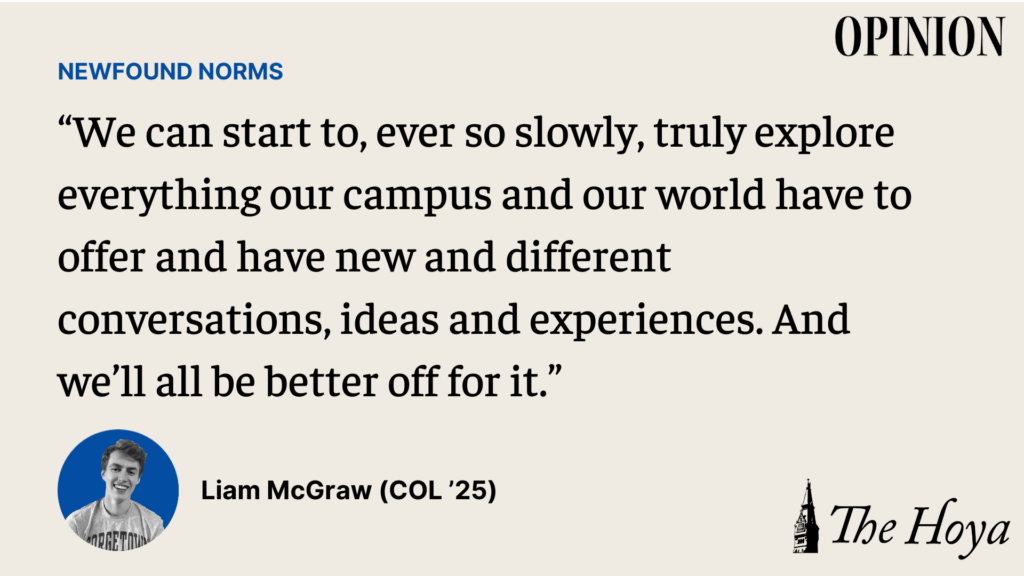“Opposites attract” is a maxim of relationships, a principle of electromagnetics and a mainstay on Paula Abdul greatest hits compilations. Nevertheless, it doesn’t actually bear out when tested. People are drawn to those like them. Researchers debate the reason for this behavior; they’ve proposed everything from the comfort of familiar interactions to the certainty of acceptance. But the veracity is well-established: We like those like us.
For many of us, coming to college was a breath of fresh air. I know it was for me. After going to school in New York City for four years, I thought — with the classic New York arrogance — I’d already seen all the world had to offer. But now here I am, surrounded by people who call everywhere from Afghanistan to Zimbabwe home; and now here we are, united on one campus and exposed to new people and perspectives. Yet as eye-opening as this experience can be, it can also breed insecurities and ultimately encourage us to shrink back into our comfortable, natural bubbles so that we never see much of the world beyond what we already know. But if we make a concentrated effort to reach beyond these bubbles and dare to be discomfited, there will be so many people to meet and so much potential to grow.
Homogeneity is safe and conformity comfortable. Whether it’s a group of five walking through Yates with the ambiguous, omega-sign-esque squiggle indicating Lululemon’s handiwork embossed on each of their identical leggings or a group of seven in pastel-colored polos and baseball caps with appropriately anodyne designs emblazoned above the brims, we have a tendency to find others who don’t feel like others. We’re drawn irresistibly to them, like a moth to a flame.
And that’s not just a simile for attraction. The dangers of only associating with those we’re immediately comfortable with are just as harmful as a flame engulfing a moth’s wing. When we continually fail to put ourselves in unknown situations and interactions, it’s a profound form of psychological limitation. We become inescapably ensconced in a morass of unexamined ideas and unyielding notions, entirely incapable of growing as thinkers or community members, and we never encounter the greatest joy of a vibrant college campus and student body: new, uncomfortable experiences.
Now, there is a distinct difference between celebrating and embracing your identity and closing yourself off to others who haven’t lived like you. Whether through cultural societies or club sports, spending time with those who have similar backgrounds and interests can be an incredibly enriching experience. It only becomes harmful when flocking to people like you becomes a coping mechanism for dealing with the discomfort of the unfamiliar and when we attach ourselves so strongly to our flocks that we never venture beyond.
It’s easy, when faced with uncertain situations, to search for those who can set you at ease. Change is difficult and uncertain; it’s natural to push back. And there are few changes bigger than going off to college. But there are also few places where embracing change wholeheartedly is more important. In college, the guardrails are down and the future is wide open. Yet we’re not taking advantage of this opportunity if we’re cocooning ourselves from the unknown with familiar people and straightforward situations.
Consider your friends. Do most of them look like you? Act like you? Think like you? I know most of mine do. And I love them dearly. That doesn’t need to stop. What should change, though, is our perception of what a friend can be. Friends needn’t always be similar to us; they needn’t always — or even usually — agree with us; all they should do is make us better, and we should do the same for them. Aristotle saw friendships as “good” when friends “become better … by their activities and by improving each other.” So find those who can improve you and who you improve, no matter who they are or where they come from.
Despite that clear exhortation, though, this article is less a call to action than a call to attention. Once we’re aware of the myopia that so often surrounds our conception of “friend” and the comfortable bubbles we’re inevitably drawn to, the necessary escape from these bounds can begin. We can start to, ever so slowly, truly explore everything our campus and our world have to offer and have new and different conversations, ideas and experiences. And we’ll all be better off for it.
Liam McGraw is a first-year in the College. Newfound Norms is published every other week.














